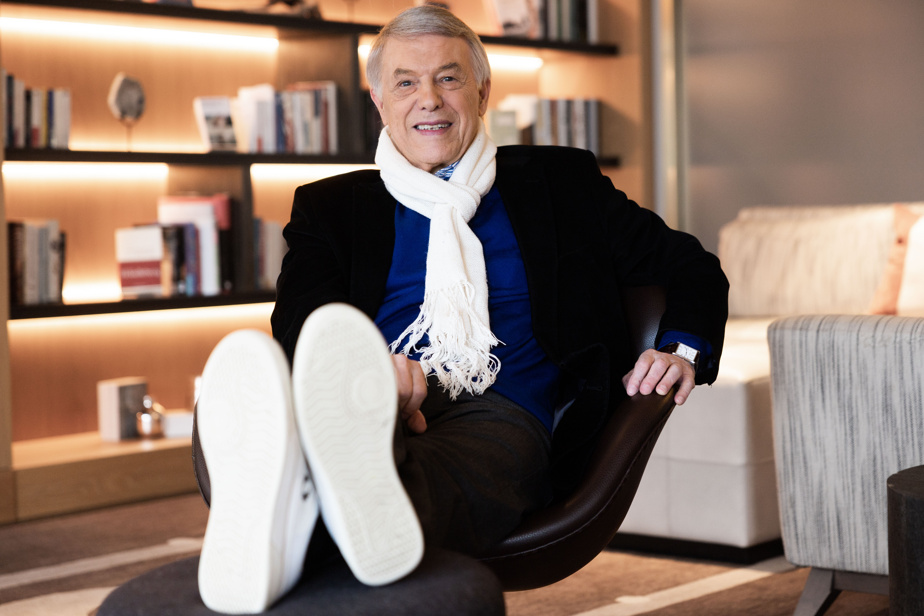Salvatore Adamo wears “youthful” white sneakers, but greets each concert with gratitude – “because I know the next one is more of my last than my first”. Interview with a legend who takes nothing for granted, passing through Quebec for ten dates.
If two options present themselves to those who have survived the ordeal, to lock themselves in anxious pessimism or to welcome each new minute as a gift, Salvatore Adamo undeniably belongs to the second category.
“I put on my white trainers because every time I wear them they tell me I look young,” he jokes as he greets us Monday afternoon on the 21st floor of the Queen Elizabeth. Young forever? This is the title of his reinterpretation of Forever Young by Alphaville, a surprising moment from In French Please!, his most recent album of French adaptations of Anglo hits, produced by Stephan Eicher.
Thank you, Mr. Adamo, for taking the time to meet with us. “Thank you for taking the time to come and meet me,” the Italian-Belgian singer replies, pressing “over you,” as if the future of his career depended on this interview. “I’m not going to pull out the glow brush, but the media is part of our success. You maintain it. »
What might pass for politeness, even sycophancy, to someone else probably has to do with the humble origins of the 79-year-old man sitting in front of us, the one who, even in a luxury hotel , remains the son of Concetta and Antonino, Italian immigrants.
At the age of 20, when Salvatore Adamo softened the hearts of the Francophonie thanks to Sans toi ma mie, it was his whole family that he allowed to migrate from social class. “I suddenly switched from one world to another, he says before paraphrasing Coluche, but I did not become a new rich, I remained an old poor. »
Like his mother who, even after her son allowed him to breathe more easily, “stocked the cellar with pasta and oil whenever there was a sale at the supermarket,” Adamo continued. to be not thrifty, but invested with the awareness that one’s destiny depended at least in part on chance.
“And then it must be said that I was privileged, because I gave a lot in the disease, and from my early childhood”, he adds, an astonishing sentence.
Privileged to have been sick? At 7 years old, the young Salvatore was struck by meningitis, then at 40, by a heart attack. Earlier this year, the creator of It’s my life and Inch’Allah was confined to silence for several weeks by a problem of aphonia caused by tear gas. Randomly walking through the streets of Santiago, Chile, the visitor accidentally crossed paths with a demonstration.
I had forgotten that roses are roses, sang Adamo in 1971, but he never forgot it. “The song is for those who may need to be reminded. »
Giovanna Adamo, Salvatore’s kind sister, who has also been his assistant for more than 30 years, interrupts our interview as discreetly as possible in order to hand her big brother a mouth spray to help him preserve his voice. “Giovanna is one of four sisters I have left,” said the eldest of seven children, suddenly moved. A few minutes earlier, his wife, Nicole, had come to greet us.
Why does Salvatore Adamo, at 79, impose on himself the heaviness of a stay of ten shows in three weeks in Quebec, when he could spend quiet days at home in Brussels? Because there is worse in life than spending three weeks traveling with his wife and sister, and because he knows full well the fragility of everything.
At the bend of an answer on another subject, the singer evokes his brother, guitarist in his group, left at 51 years old, in 2005, then their father, left in 1966. He was 46 years old and had just been offered by his son a restaurant.
Salvatore Adamo, a friend of Montreal since his first visit during Expo 67, takes nothing for granted. Life, anyway, regularly brings him back to his humility. A touching example was four years ago. Lili, her 6-year-old granddaughter, accompanied her grandmother to the ATM that day. This money, where does it come from, asked the kid, who still didn’t know anything about her grandpa’s career. “It’s from grandpa’s job,” replied the granny. What does grandpa do? “He does concerts. »
“A month later,” the grandpa continues with that smile on his face that explains at least half of his fame, “I’m sitting at home with my granddaughter, who turns to me and says, ‘ Say, Grandpa, are you giving me a gig? “I get up, I go get my guitar, I come back to the living room and she says to me: ‘No, you’re still not going to sing! “”
